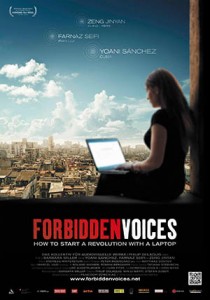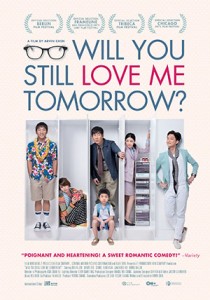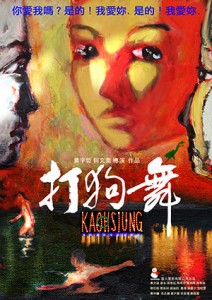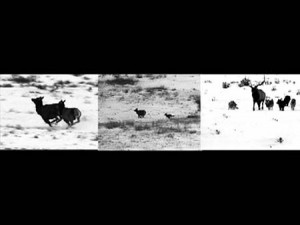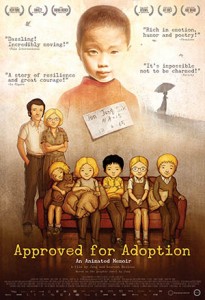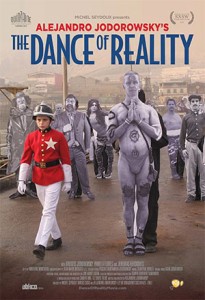HONEST TRUTHS: WHY HUMAN RIGHTS PRINCIPLES SHOULD GUIDE DOCUMENTARY FILMMAKING
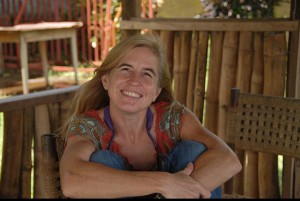 A talk by Kelly Matheson
A talk by Kelly Matheson
9:00 a.m. George S. Turnbull Center, 70 NW Couch St., Portland
Kelly Matheson, recipient of the first James Blue Award presented by the James and Richard Blue Foundation, is the senior attorney and program manager for WITNESS, an international human rights organization that specializes in using video to support change in human rights practice, policy, and law.
Video is increasingly central to human rights work, campaigning, and advocacy. It has been critical in drawing worldwide attention to corruption, torture, denial of rights, and repression around the world. More human rights video is being captured, produced, and shared by more people in more places than ever before, often in real-time. This has, in turn, raised a new series of ethical challenges that we must address to ensure that the thousands of people using video for human rights can do so as effectively, safely, and ethically as possible.
Cosponsored with UO School of Journalism and Communication’s “What is Documentary?” Conference.
FORBIDDEN VOICES
1:00 p.m. Bijou Art Cinemas
![]()
 The Internet has provided a medium of expression that can, in the hands of courageous individuals, counter the power of repressive regimes. Forbidden Voices accompanies three brave young cyberfeminists as they risk their lives to challenge their governments. Eyewitness reports and clandestine footage show Yoani Sánchez’s brutal beating by Cuban police for criticizing her country’s regime on her blog, Generación Y; Chinese human rights activist Jinyan under house arrest for four years; and Iranian journalist and women’s advocate Farnaz Seifi forced into exile, where she blogs under a pseudonym. Tracing each woman’s use of social media to denounce and combat violations of human rights and free speech in her home country, Forbidden Voices attests to the Internet’s potential for building international awareness and political pressure.
The Internet has provided a medium of expression that can, in the hands of courageous individuals, counter the power of repressive regimes. Forbidden Voices accompanies three brave young cyberfeminists as they risk their lives to challenge their governments. Eyewitness reports and clandestine footage show Yoani Sánchez’s brutal beating by Cuban police for criticizing her country’s regime on her blog, Generación Y; Chinese human rights activist Jinyan under house arrest for four years; and Iranian journalist and women’s advocate Farnaz Seifi forced into exile, where she blogs under a pseudonym. Tracing each woman’s use of social media to denounce and combat violations of human rights and free speech in her home country, Forbidden Voices attests to the Internet’s potential for building international awareness and political pressure.
Director Barbara Miller offers a searing, unfettered look into a new kind of revolutionary. Her film documents the potential of a medium that is almost inherently uncontrollable. Miller’s work is certainly inspiring, but the viewer is also offered no illusions. The film makes no attempt to dilute the potential for government retaliation against bloggers. Yet, as stated by Michelle Obama at a ceremony honoring Sanchez among others, “Time and again these women have shown us a very simple truth: that courage can actually be contagious.” However long they remain visible, the words of Sanchez and others leave an indelible impact on the people of repressive nations. Miller’s film is a striking testament to the power of those words.
Cosponsored with the Good Works Film Festival and the Wayne Morse Center for Law and Politics. A discussion will follow the screening led by Kellie Matthews and Laura Strait.
FOUR ON BLUE
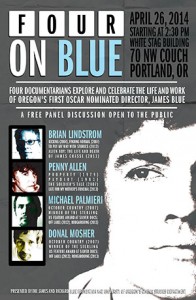 Brian Lindstrom, Michael Palmieri, Donal Mosher, and Penny Allen discuss documentary filmmaker James Blue
Brian Lindstrom, Michael Palmieri, Donal Mosher, and Penny Allen discuss documentary filmmaker James Blue
2:30 p.m. George S. Turnbull Center, 70 NW Couch St., Portland Free
Is it possible to capture the truth, using a camera? James Blue probed this question throughout his career as a director, journalist, film historian, and educator. In this onstage conversation, four Oregon documentarians explore and celebrate the life and work of Oregon’s first Oscar-nominated director, and its relevance to their filmmaking practices today. Illustrated with clips from his films.
Brian Lindstrom’s most recent film, Alien Boy (2012), provoked structural changes in the way the City of Portland handles the intersection between community policing and community mental health. Shawn Levy wrote, “Brian Lindstrom’s Alien Boy: The Life and Death of James Chasse is a documentary that plays out like a horror film and leaves you absolutely breathless.” Brian Lindstrom is from Portland.
Michael Palmieri makes music videos (Beck, Foo Fighters, Belle and Sebastian) and commercials (Sony, Mac, Coca-Cola). Earlier in his career he was a member of Quentin Tarantino’s Los Angeles based production company A Band Apart. He made the award winning documentaries October Country (2009), an intimate portrait of a family, and Off Label (2012), an investigation of big business pharmacology, in partnership with Donal Mosher. From Southern California, Michael Palmieri now lives in Portland.
Donal Mosher’s photography explores “hauntology, specters and phantoms.” He made the award winning documentaries October Country (2009), an intimate portrait of a family, and Off Label (2012), an investigation of big business pharmacology, in partnership with Michael Palmieri. From upstate New York, Donal Mosher now lives in Portland.
Penny Allen’s first feature film, Property (1977), was a prizewinner at the very first Sundance Film Festival. The godmother of Portland’s indie scene now lives in Paris. Her third feature film, Late For My Mother’s Funeral (2013), is about ten adult siblings adjusting to the death of a matriarch. A documentary/narrative hybrid, it was shot in Algeria. Penny Allen is from Portland.
Cosponsored with the James and Richard Blue Foundation and the “What is Documentary?” conference.
WILL YOU STILL LOVE ME TOMORROW?
4:00 p.m. Bijou Art Cinemas
![]()
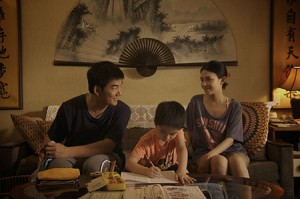 Optometrist Weichung has the perfect family he always wanted, complete with an adoring young son and beautiful wife. Unfortunately, he can’t quite quell his one misgiving about their relationship—his partner is of the wrong sex. Will You Still Love Me Tomorrow? playfully examines the intricacies of sexuality in a changing Taiwan. Weichung’s marital pretense is juxtaposed with the seemingly doomed engagement of his sister, who wavers despite extravagant courtship from her suitor. Both siblings aggressively seek to remedy their relationships to avoid a pervasive fear of life lost to regret.
Optometrist Weichung has the perfect family he always wanted, complete with an adoring young son and beautiful wife. Unfortunately, he can’t quite quell his one misgiving about their relationship—his partner is of the wrong sex. Will You Still Love Me Tomorrow? playfully examines the intricacies of sexuality in a changing Taiwan. Weichung’s marital pretense is juxtaposed with the seemingly doomed engagement of his sister, who wavers despite extravagant courtship from her suitor. Both siblings aggressively seek to remedy their relationships to avoid a pervasive fear of life lost to regret.
Director Arvin Chen provides a playful exploration of a post-traditionalist Taiwanese culture he calls “pretty open.” Will You Still Love Me Tomorrow? gently probes its audience with difficult questions about the nature of family and love, but remains thoroughly lighthearted. This is in part thanks to a quirky and endlessly entertaining array of supporting characters. New York Times film critic Nicolas Rapold credits the film with a “maturity that eludes more ambitious dramas on the subject.” That maturity separates the film from many other romantic comedies, providing underlying sustenance that endures long after the raucous laughter.
WOLF
A live performance by Deke Weaver
6:30 p.m. Jordan Schnitzer Museum of Art
![]()
 Wolf is the third chapter in Deke Weaver’s life-long endeavor, The Unreliable Bestiary, a performance for every letter of the alphabet, each letter represented by an endangered species. Inspired by the literary concept of the unreliable narrator and the medieval bestiary, which gave every living thing a spiritual purpose, The Unreliable Bestiary is an ark of stories about animals, our relationships with them, and the worlds they inhabit. With climate change and an exploding population pushing half the species on the planet into extinction, and with the lions and tigers and bears of our ancient myths and stories threatened, Weaver’s project makes us wonder: What will we do when our dreams disappear?
Wolf is the third chapter in Deke Weaver’s life-long endeavor, The Unreliable Bestiary, a performance for every letter of the alphabet, each letter represented by an endangered species. Inspired by the literary concept of the unreliable narrator and the medieval bestiary, which gave every living thing a spiritual purpose, The Unreliable Bestiary is an ark of stories about animals, our relationships with them, and the worlds they inhabit. With climate change and an exploding population pushing half the species on the planet into extinction, and with the lions and tigers and bears of our ancient myths and stories threatened, Weaver’s project makes us wonder: What will we do when our dreams disappear?
Sheep-killer to ranchers, spirit animal to New Age seekers, admired by many hunting cultures, devil incarnate to medieval European farmers—the wolf’s spot at the top of the food chain elicits strong reactions. Wherever the wolf peers out of the forest, he stirs up the old stories. On stage in the Schnitzer Museum, Weaver will perform his own versions of these stories, with video accompaniment. According to Dennis Weaver of SF Weekly, “Weaver’s writing intrigues, while his conspiratorial, cool-to-manic stage presence trips nuggets of off-kilter humor like a tap-dance through landmines.”
Cosponsored with the Department of Theatre Arts.
TAKAO DANCER
With codirectors Wen-shing Ho and Ouchul Hwang
6:45 p.m. Bijou Art Cinemas
![]()
 In Takao Dancer, an attempt to escape the confines of an insular Taiwanese fishing village ruptures the lives of all those involved. The paths of childhood friends Chi, Yi, and Kong grow increasingly discordant after a jointly botched crime renders Chi a lifelong fugitive. Having successfully migrated to the big city, Kong joins the police force and is set to marry Yi when she starts receiving secret letters from Chi. By this point a seasoned and accomplished criminal, Chi is soon under investigation by his former best friend, laying the groundwork for a perilous love triangle. The film is far from a simple thriller, however. Directors Wen-shing Ho and Ouchul Hwang accentuate Takao Dancer with a pervasive artistic energy that defies categorization.
In Takao Dancer, an attempt to escape the confines of an insular Taiwanese fishing village ruptures the lives of all those involved. The paths of childhood friends Chi, Yi, and Kong grow increasingly discordant after a jointly botched crime renders Chi a lifelong fugitive. Having successfully migrated to the big city, Kong joins the police force and is set to marry Yi when she starts receiving secret letters from Chi. By this point a seasoned and accomplished criminal, Chi is soon under investigation by his former best friend, laying the groundwork for a perilous love triangle. The film is far from a simple thriller, however. Directors Wen-shing Ho and Ouchul Hwang accentuate Takao Dancer with a pervasive artistic energy that defies categorization.
The film features several of Hwang’s own abstract paintings, along with an eclectic infusing of artistic techniques ranging from time-lapse photography to interpretive dance. An enticing narrative anchors this unusual aesthetic audacity, described by Variety’s Dennis Harvey as “a giddy demonstration of stylistic techniques that can be applied to the medium.” A film this ambitious requires a range of artistic prowess that is quite uncommon, but certainly possessed by Ho and Ouchul.
HOPE AND PREY
A live performance by Vanessa Renwick and Daniel Menche
8:00 p.m. Jordan Schnitzer Museum of Art
![]()
APPROVED FOR ADOPTION
Screening and discussion with codirector Jung
8:00 p.m. Whitsell Auditorium, Portland Art Museum
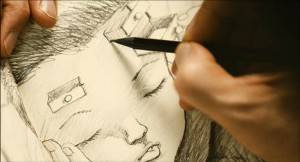
The Korean War left thousands of young refugees scattered across Europe and the United States. In this vibrant, animated documentary, Jung Henin, the film’s co-director and subject, retells his experience as a South Korean adoptee growing up in Belgium. The film spans the period from an animated 1970s Belgium to present day Korea, where a live-action Henin reconciles with his past.
Now an accomplished artist, Jung was far from disciplined growing up. What New York Times critic Nicolas Rapold describes as a “rambunctious childhood” at times borders on horrifying. Jung’s retelling of the precipitous follies of his youth is undoubtedly an act of catharsis. His was no ordinary adolescent identity crisis. There are palpable undertones of neglect and a young Jung seems distantly aware that he may have been adopted more as chic commodity than actual child. Jung’s adoptive parents often seem more concerned with their own reputation than his well being. The film moves through a variety of tones, as the darkness of his youth is often trumped by a lighter, adult sensibility. Jung acknowledges the shortcomings and, perhaps, misguided intentions of his adoptive family, but does so with midlife serenity. This is not a story of a boy lost to circumstance, but of a man who managed to elude his demons through artistry and creative expression. That expression culminates, fittingly, in a film that leaves viewers with a bit of Jung’s hard fought serenity.
Approved for Adoption offers a level, almost meditative perspective on an embittered childhood that will resonate with many viewers, particularly those who have raised or been adoptees. Cosponsored with Holt International, UO Comics and Cartoon Studies, and Unifrance.
ADRENALINE FILM PROJECT SCREENING AND AFTERPARTY
Hosted by Jeff Wadlow, Leigh Kilton-Smith, and Omar Naim
9:30 p.m. PLC 180 on the University of Oregon campus 1415 Kincaid Street
![]()
![]()
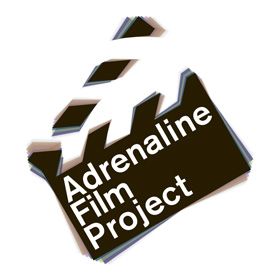 Come see the results of Eugene’s fifth Adrenaline Film Project. On Wednesday, April 23, several teams of filmmakers will be assigned a genre and given a line of dialogue and prop to be incorporated into their productions. For the next seventy-two hours, they will pitch, write, shoot, and edit their films, turning them in at 5:00 p.m. on Saturday, April 26. The mentors who guide them through the seventy-two-hour process (Jeff Wadlow, Leigh Kilton-Smith, and Omar Naim,) will host the films’ premieres, and the assembled crowd will vote for an Audience Award. A jury of film professionals will also give one film its top prize, the Kalb Award, and the mentors will select a third-prize winner. Following the screening, your ticket will get you into the celebratory Adrenaline Afterparty, featuring music and refreshments in the Jordan Schnitzer Museum of Art!
Come see the results of Eugene’s fifth Adrenaline Film Project. On Wednesday, April 23, several teams of filmmakers will be assigned a genre and given a line of dialogue and prop to be incorporated into their productions. For the next seventy-two hours, they will pitch, write, shoot, and edit their films, turning them in at 5:00 p.m. on Saturday, April 26. The mentors who guide them through the seventy-two-hour process (Jeff Wadlow, Leigh Kilton-Smith, and Omar Naim,) will host the films’ premieres, and the assembled crowd will vote for an Audience Award. A jury of film professionals will also give one film its top prize, the Kalb Award, and the mentors will select a third-prize winner. Following the screening, your ticket will get you into the celebratory Adrenaline Afterparty, featuring music and refreshments in the Jordan Schnitzer Museum of Art!
THE DANCE OF REALITY
9:30 p.m. Bijou Art Cinemas
![]()
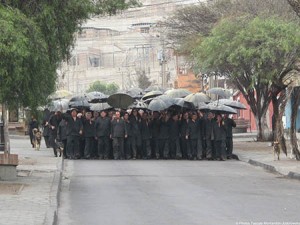 After a nearly 23-year hiatus, Chilean surrealist Alejandro Jodorowksy returns with a radiantly visceral film that is—and is much more than—an autobiography. The legendary filmmaker was born in 1929 in Tocopilla, a coastal town on the edge of the Chilean desert where the film was shot. It was there that Jodorowsky underwent an unhappy and alienated childhood as part of an uprooted family.
After a nearly 23-year hiatus, Chilean surrealist Alejandro Jodorowksy returns with a radiantly visceral film that is—and is much more than—an autobiography. The legendary filmmaker was born in 1929 in Tocopilla, a coastal town on the edge of the Chilean desert where the film was shot. It was there that Jodorowsky underwent an unhappy and alienated childhood as part of an uprooted family.
The mercurial 84-year-old’s life has certainly provided ample material. In The Dance of Reality, a young Jodorowsky is confronted by an immensely varied collection of characters, all of whom contribute in some way to his burgeoning surreal consciousness. These characters include, among others, a wise drunk, dwarfs, mine workers, clowns, and Jodorowsky’s own loving mother, who communicates only in disharmonious hymns. The film is not purely insular, however. Jodorowsky also addresses Chilean social issues that were pertinent during his youth with, of course, an irrepressible surrealist tinge.
Jodorowsky rose to prominence with the 1970 cult classic, El Topo, which left an indelible impact on surrealist film. His latest work is no less ambitious, making the most of its relatively small 3 million dollar budget. Blending his personal history with metaphor, mythology, and poetry, The Dance of Reality reflects Alejandro Jodorowsky’s philosophy that reality is not objective but rather a “dance” created by our own imaginations.
